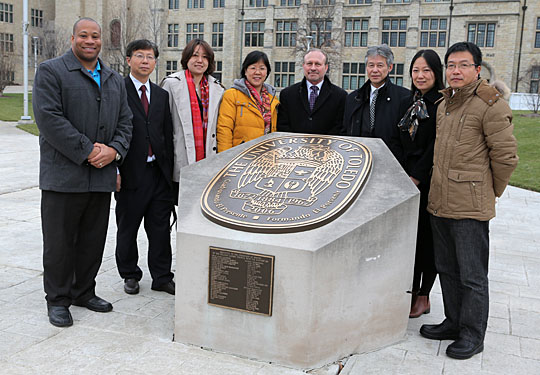The University of Toledo is changing the way international students study in the United States, with the help of a few community colleges.
A new program called the UT-Community College Internationalization Consortium kicks off this semester. It brings together four community colleges in Ohio and Michigan — Henry Ford College, Jackson College, Schoolcraft College and Columbus State Community College — with eight higher vocational colleges in Shanghai, Jiangsu, Zhejiang, Hebei, and Hunan provinces in China.

Posing for a photo in December were, from left, Dr. Sammy Spann, UT assistant provost for student engagement; Dr. Huaiting Wang, vice dean of the electronic information school at Shanghai Dianji University; Dr. Zhiwei Pu, director of international coordination at Shanghai Dianji University; Dr. Lijiang Sun, dean of the business school at Shanghai Dianji University; Dr. Ron Opp, UT associate professor of educational leadership and executive director of the UT-Community College Internationalization Consortium; Dr. Bin Jiao, vice president of Shanghai Dianji University; Dr. Aige Guo, UT international affairs program manager; and Dr. Xiaogang Fu, dean of the higher vocational technology school at Shanghai Dianji University.
“I think if you really want to be educated for the work force of the future, you’re going to have to develop your global competence,” said Dr. Ron Opp, executive director of the consortium and UT associate professor of educational leadership. “You’re going to need the ability to communicate interculturally; that’s going to be the nature of work in a global economy.”
In China, higher vocational colleges are postsecondary schools similar to community colleges in the United States. Each college tends to have a niche — whether it’s environmental sciences, engineering, business or another subject. Each community college in the consortium will be matched with two vocational colleges based on their niche.
Many community colleges want to have more international students, but often don’t have the resources four-year schools have, Opp said. Consortium staff will help these community colleges make connections with partner higher vocational colleges in China, and will assist them in working with their partners in developing joint degree programs.
“America is one of the most technologically advanced countries, and China is among the fastest developing countries,” said Dr. Bin Jiao, vice president at Shanghai Dianji University, who visited UT in December with other delegates from Shanghai Dianji. “I think from this kind of collaboration we can learn from each other.”
The consortium will begin by accepting five students from each Chinese college in fall 2015, 10 students the following fall, 15 the following year, and so on. By 2018, the first 40 students will be enrolling at UT for their bachelor’s degree programs.
The consortium also will include professional development programming with faculty and administrators from all of the colleges involved to share more about the partner institutions, with individuals here traveling to China and vice versa.
Another aspect of the consortium is that some faculty from the community colleges involved will teach at the vocational colleges in China. Those who do will get assistance with their flight, housing and living expenses.
“It may be more helpful in the long run that we get our faculty over there to see how China is developing,” Opp said. “Because once you get over there and you see what’s going on, you realize how important developing global perspectives is.”
Opp said the goal of bringing faculty members to China is that they will bring their experience back to UT and the community colleges.
“I’m looking forward to having Toledo faculty come to our university,” Jiao said. “We also welcome students and faculty from this consortium to visit us.”